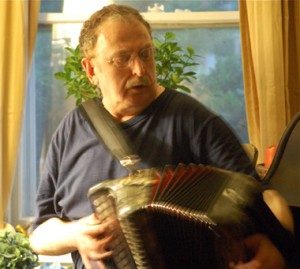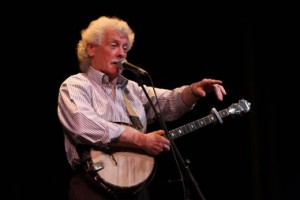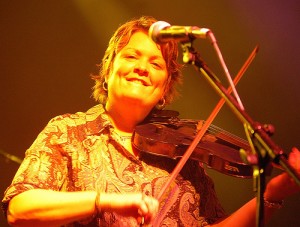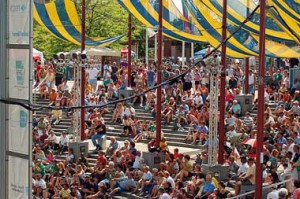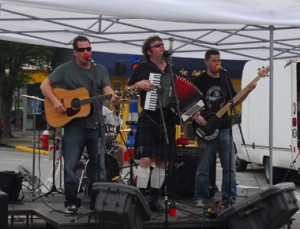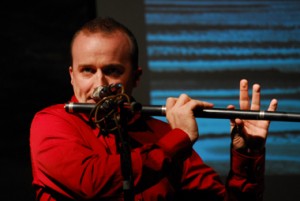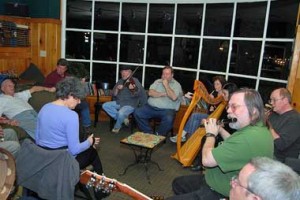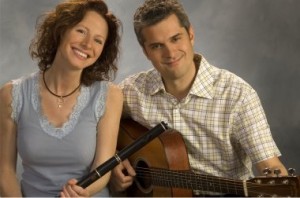
Shannon and Matt Heaton are performing in Bethlehem on April 25.
When Shannon and Matt Heaton sent me their new CD, “Lovers Well,” in February, I thought, “Perfect, love songs, just in time for Valentine’s day.” Then I listened.
At least two of the tunes involve dogs and guns. Several describe some serious flirting that could be called by another name, but we can’t say it here. And yes, there are sweet songs of undying love, but there’s also some dying going on too.
“Okay, they’re relationship songs, really,” laughed Shannon when I pointed this out to her. “When we tried to have love be the hook, it was cumbersome. Relationships are complicated. A friend told me about a book she’d read by [psychotherapist and spiritual writer] Thomas Moore who said ‘Every relationship has an end.’ It’s really simple. A lot of time the end is parting, somebody’s died, or jealousy gets the best of you. When we say these are love songs, we’re talking about so many different aspects of relationships. It’s how we manuever them.”
They’re not Barry White and they’re certainly not Paul McCartney, but they are tunes that certainly do capture the richness and poignancy of love. Some may actually be familiar to you, like “Lily of the West,” a traditional American folk song that’s been covered by Bob Dylan, Joan Baez, and Peter, Paul and Mary, but which has been “Irish-ized” by Shannon Heaton (Flora is now Molly and she comes from Ireland, not Lexington). It’s a story of obsessive love, betrayal, and eventually murder. “The Golden Gloves” is a delightful tale of a young betrothed woman who falls in love with the man chosen to give her away and discovers a clever way to marry the true man of her dreams on her wedding day.
And there is the lovely, lilting “Lao Dueng Duen,” which I at first thought was in Irish but is actually a Thai song Shannon learned when she spent a year in Thailand on a Rotary Club scholarship when she was a teenager. The child of globe-trotting parents (she spent some of her childhood in Nigeria where her mother was teaching on a Fulbright Scholarship) Heaton had wanted to go to France to learn the language, but chose Thailand after she heard all of the other scholarship winners opt for either Paris or London. “I was ambarrassed that no one had chosen Africa or Asia so when they got to me I said, ‘How about Thailand?’ My mother picked me up and said, ‘So, are you going to France?’ and I said, ‘No, Thailand,’ then burst into tears. All because I was too stubborn to be like everybody else!”
Since she didn’t speak Thai, she asked to be placed with a bi-lingual family. Looking back on it, she says, she should have been more specific. Her family was bi-lingual—they spoke both Thai and Chinese. Heaton didn’t speak Chinese either. But she did learn Thai eventual.
“My first year of college I was doing cooking, banana leaf folding, doll making, and music,” she laughs. “ It was kind of like home ec, called life sciences. Eventually my language got good enough so I majored in ethnomusicaology.” (She returned to spend her junior year there as well.)
She still speaks Thai fluently, so for the CD, she sings in Thai, only translating the melody so it would have a Celtic sound. The liner notes include her rough translation of the lyrics—and this one is a classic love song:
“Oh my love, my moon.
Like the fragrance of a flower
Such is the heady perfume of her essence.
It envelopes me completely, like nothing before.
The scent of her, [my soul mate], this beautiful woman
Oh the sweetness of this love.”
“I’ve always been really nervous to do that song when we perform, but [musician and folklorist] Mick Moloney encouraged me to do it,” she explains. “We performed it at a benefit Mick organized in October to raise money for the Mercy Center in Thailand. Mick has a home in Thailand and he’s studying meditation and aiming to spend more time there.”
And she added it to “Lovers Well” not only because it’s a pure love song, but because “ singing it, I’m immediately transported back to Thailand, where I’m sitting in my teacher’s livingroom, I’m 17, and it’s hotter than hell. I don’t speak Irish, but I can imagine that the same thing happens to people who might have learned sean nos in Ireland. When they sing in that language, there’s an immediate transportation back home. ”
But what about her own love story? The Heatons met in 1992 “because I need a guitar player for a wedding gig. He was the first person I called who was home so he got the job.” (Their friend, Steve, was first on her list. “Musically we’re not compatible and personally I don’t think it would have worked out, so I’m glad Matt was home and Steve wasn’t,” she says.)
Matt had an eclectic background. He studied classical guitar, played in rock bands, and was writing tango music when they met. “At the same time he was doing independent study in Irish traditional music because he was interested in it,” she says. The two picked up tunes and techniques (he for guitar, Shannon for flute and voice) playing in sessions in Chicago and later on many trips to County Clare. Moving to Boston—one of the most Irish cities in America—also helped cement their bond to Irish trad. “Matt really got into it, so it’s really the only music he plays now. He kept up the tango stuff and had me try tango music with him. But we settled on Irish music.”
They married in 1995, after finishing college, and decided to perform together, a decision that has been both a joy and a challenge, Shannon says.
“It is a profound challenge—how to keep thing separate and how to integrate things, especially,” she laughs, “when you live in a small house.”
And when you’re also on the road together, as they are now, promoting their CD of eclectic love songs. Matt and Shannon Heaton will be appearing on Saturday, April 25, at the Godfrey Daniels Coffee House in Bethlehem (http://www.irishphiladelphia.com/calendar for details). If you decide to go—and I encourage it—you’ll see that, despite the challenges, these two make beautiful music together.

